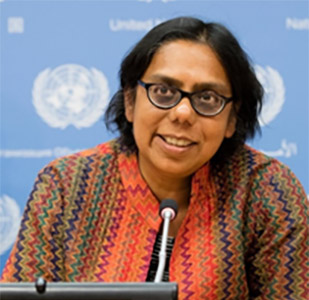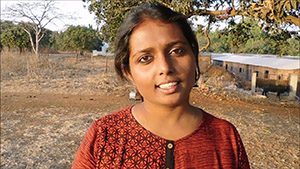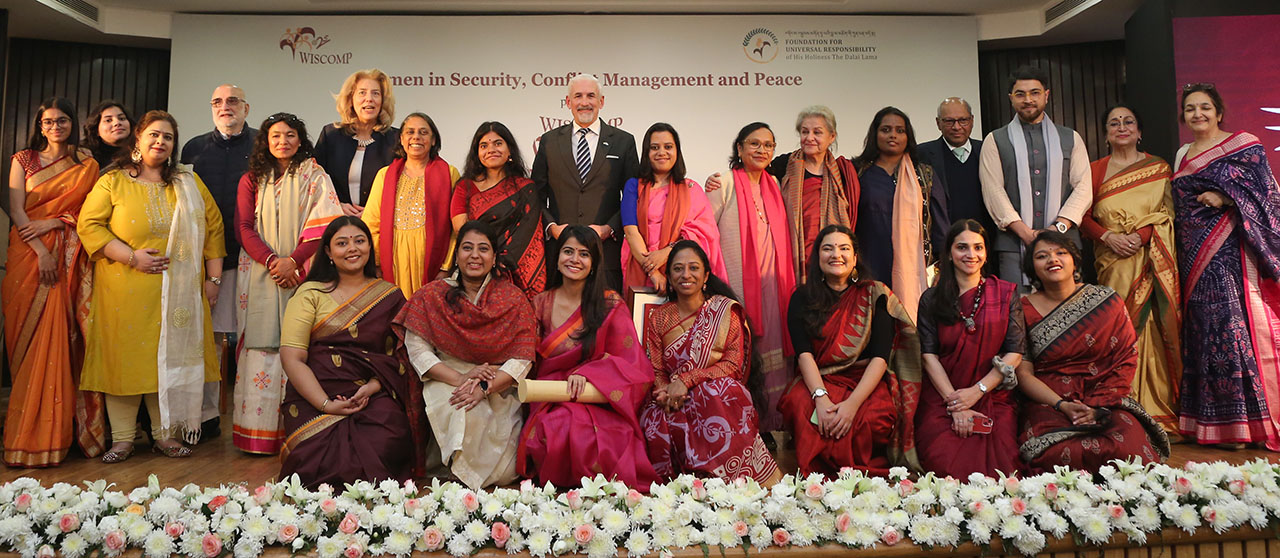
The WISCOMP Saahas Awards 2024 recognize and celebrate the work of those who demonstrated resilience and initiative to build a vocabulary of peace and non-violence in the South Asian region. Individuals and organizations that foreground the 4 pillars of the United Nations Security Council Resolution 1325 on Gender, Peace and Security—Participation, Protection, Prevention and Relief and Recovery—in their work were encouraged to apply. This included addressing multiple issues in areas of protracted conflict, such as gender-based violence; support to survivors of sexual violence; trauma healing; fostering dialogue and reconciliation; peace education initiatives; and rehabilitation of former combatants and forcibly displaced women.
About the Awards
Applications were invited under two categories from South Asia – from individuals – practitioners, media persons, educators, youth leaders, artists, civil society members and others who work with women to build peace at the grassroots, and organizations working on gender, peace and security in areas of protracted conflict. With this edition, Saahas Awards expands its footprints from India to the South Asian region.
We received over 50 applications from – Afghanistan, Bangladesh, India, Nepal, and Pakistan. Applications from Assam, Bodoland Territorial Region, Cox Bazar, Gilgit, Islamabad, Kabul, Kathmandu, Kolkata, Lahore, Rajasthan, Srinagar, Thane and others represented work on diverse issues and wide-ranging methods.
The Review Process involved development of factsheets, in-depth interviews, background checks on each applicant and design of an online evaluation portal. A jury consisting of eminent experts screened and reviewed the submissions to finalize the awardees through face to face deliberations and online evaluation.
Saahas Shreshtha Award: Shero of Courage
Patricia Mukhim
Patricia Mukhim is a fearless journalist and peacebuilder from Shillong, renowned for her unwavering advocacy for gender equality, the rights of marginalized communities and her dedication to fostering communal harmony. Through her impactful work with The Shillong Times and her initiative She has been a beacon of resilience and a champion for justice in conflict-affected regions of North East India.
Saahas- e -Azim Award
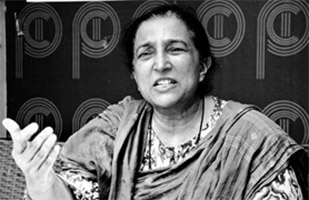 Saeeda Diep is a peace activist and human rights advocate from Pakistan, championing the rights of religious minorities, especially Hindus through a gender lens. As the founder of the Centre for Peace and Secular Studies, her work bridges divides through cultural harmony and cross-border peacebuilding initiatives.
Saeeda Diep is a peace activist and human rights advocate from Pakistan, championing the rights of religious minorities, especially Hindus through a gender lens. As the founder of the Centre for Peace and Secular Studies, her work bridges divides through cultural harmony and cross-border peacebuilding initiatives.
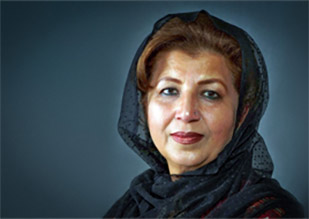 Mossarat Qadeem is a peacebuilder and women’s rights activist from Pakistan pioneering initiatives to prevent violent extremism and foster community resilience. Through her organization PAIMAN Trust, she empowers women and radicalized youth in conflict zones to become agents of peace and reconciliation.
Mossarat Qadeem is a peacebuilder and women’s rights activist from Pakistan pioneering initiatives to prevent violent extremism and foster community resilience. Through her organization PAIMAN Trust, she empowers women and radicalized youth in conflict zones to become agents of peace and reconciliation.
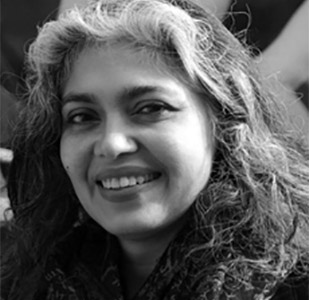 Beena Sarwar is a journalist, filmmaker, and peace advocate from Pakistan, committed to gender equality and fostering dialogue between India and Pakistan. Through initiatives like SAPAN and her impactful documentaries, she addresses critical issues of human rights, communal harmony, and social justice.
Beena Sarwar is a journalist, filmmaker, and peace advocate from Pakistan, committed to gender equality and fostering dialogue between India and Pakistan. Through initiatives like SAPAN and her impactful documentaries, she addresses critical issues of human rights, communal harmony, and social justice.
Saahas Shakti Award
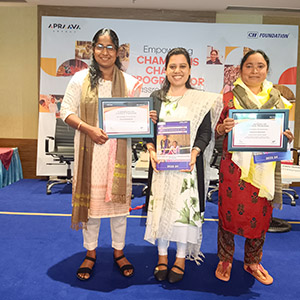 Laxmi Chetri is a grassroots peacebuilder and gender justice advocate in Assam, India, empowering domestic violence survivors and marginalized women in the Bodoland Territorial Region. Through innovative methods to counter domestic violence in the camps, she has worked towards nurturing gender-just communities in the North eastern states of India.
Laxmi Chetri is a grassroots peacebuilder and gender justice advocate in Assam, India, empowering domestic violence survivors and marginalized women in the Bodoland Territorial Region. Through innovative methods to counter domestic violence in the camps, she has worked towards nurturing gender-just communities in the North eastern states of India.
Deepa Pawar is an activist from Maharashtra, India, advocating for the rights of women and girls from NT-DNT (Nomadic and De-notified Tribes). As the founder of Anubhuti Trust, she empowers marginalized communities through education, leadership training, and gender justice initiatives.
Champion Crusader fostering cultures of peace countering misogyny in Afghanistan
Champion Crusader advocating for the rights of indigenous , ethnic and religious minorities in Bangadesh
Saahas Chetna Award
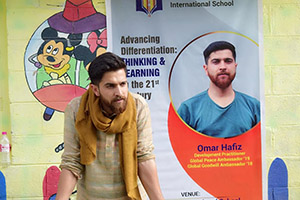 Omar Hafiz is a peacebuilder and social activist from Kashmir, India, dedicated to empowering marginalized communities, especially Trans persons and other sexual minorities. As the founder of The STEAR, he creates safe spaces, challenges stereotypes, and promotes gender equality through innovative programs and youth-led initiatives.
Omar Hafiz is a peacebuilder and social activist from Kashmir, India, dedicated to empowering marginalized communities, especially Trans persons and other sexual minorities. As the founder of The STEAR, he creates safe spaces, challenges stereotypes, and promotes gender equality through innovative programs and youth-led initiatives.
Saahas Mashal Award
The Conflict Victim Women National Network (CVWNN) is a grassroots organization in Nepal that advocates for the rights of women affected by long years of insurgency and war in Nepal. Focused on transitional justice and gender-sensitive peacebuilding, CVWNN provides psychosocial support, legal aid, and leadership opportunities to women survivors of violence and marginalization through truth telling, memorialization and documenting of their stories.
Saahas Awards Jury 2024
Ambassador Shyam Saran is former Foreign Secretary of India and Prime Minister’s Special Envoy on Indo-US Civil Nuclear Issues and Special Envoy and Chief Negotiator on Climate Change. In his illustrious career as an Indian diplomat, he served as ambassador to Myanmar, Indonesia and Nepal and as High Commissioner to Mauritius. He served as Chairman of the National Security Advisory Board under the National Security Council (2013-15). After his superannuation in 2010, he headed the Research and Information System for Developing Countries, a prestigious think tank focusing on economic issues. Currently, Ambassador Saran is President, Board of Trustees, India International Centre. In recognition of his contribution to civil services, Ambassador Saran was awarded the Padma Bhushan in 2011. In May 2019, he was conferred the Spring Order Gold and Silver Star by the Emperor of Japan for promoting India-Japan relations.
Ambassador Gautam Mukhopadhaya is Senior Visiting Fellow, Centre for Policy Research. As a member of the Indian Foreign Service, he served in various capacities in Indian Embassies and Missions in Mexico, Cuba, France, and the United Nations; the Ministry of Defence of India and as India’s Ambassador to Syria, Afghanistan and Myanmar. He also re-opened the Indian Embassy in Kabul in November 2001 as Charge d’Affaires, after the ouster of the Taliban in Afghanistan. An alumnus of the National Defence College of India, he has worked at the UN Headquarters in New York as a Consultant and as a Visiting Fellow at the Carnegie Endowment for International Peace in Washington DC.
Honorable Justice Gita Mittal is former Chief Justice of High Court of Jammu and Kashmir. She was also acting Chief Justice of the Delhi High Court. She has facilitated gender trainings for Judges and Magistrates across the country. She has been a senior arguing counsel for the Union of India in the Delhi High Court; Standing Counsel for the Delhi Development Authority; Standing Counsel and Legal Adviser for Delhi Jal Board and Bharat Scouts & Guides; and Special Counsel for the Municipal Corporation of Delhi. Justice Mittal has worked with several not-for-profit initiatives in Delhi and other parts of India on the empowerment of women and the provision of medical aid and facilities.
Krishna Menon is Professor and former Dean, School of Human Studies, Dr. B.R. Ambedkar University Delhi. Previously, she taught at the Department of Political Science, Lady Shri Ram College for Women, University of Delhi for over two decades where she was the Director of the Aung San Suu Kyi Center for Peace. She serves on the editorial boards of several prestigious journals, including the International Feminist Journal of Politics. She has published books, papers and articles on debates within Political Theory, issues in Indian Politics, and Feminist Theory and Politics. Her recent publications include Doing Feminisms in the Academy (2020), Social Movements in Contemporary India (2019), Women and Political Process (2015); Human Rights, Gender and Environment (2009). She received the Teacher of Distinction award from the Vice Chancellor of the University of Delhi in 2009.
Poonam Muttreja is the executive director of the Population Foundation of India (PFI). She has more than 35 years of experience in the socio-development sector. Before joining PFI, she worked with the MacArthur Foundation as Country Director where she was responsible for the Foundation’s grants in India. She also worked with UNDP as Advisor to the Country Representative. Ms. Muttreja has made an active contribution to the NGO sector in India. She is on the governing boards of several national and international organizations. She has founded organisations working in the area of social justice (SRUTI), craft (DASTKAR), and leadership (Founder Director of the Ashoka Foundation). She has also co-conceived the popular, transmedia initiative, Main Kuch Bhi Kar Sakti Hoon (A Woman, Can Achieve Anything). Ms. Muttreja has a Master’s Degree in Public Administration from the Kennedy School of Government, Harvard University and a Bachelor’s Degree in Psychology from the University of Delhi.
Susan Ferguson is Country Representative, UN Women, India. She has worked on international gender and development for over four decades. Ms. Ferguson joined UN Women in 2017, after a long career in international development. She has lived and worked in Philippines (Mindanao), Bangladesh, Myanmar, Afghanistan, Tonga, Fiji, Samoa, Timor Leste, South Africa, Solomon Islands and Papua New Guinea, among others. She has experience of working in grass roots development agencies; establishing and managing social services; and working within Local, State and Federal Government in Australia on social policy and social programmes. Her diverse career is spanned by the themes of gender equality and social justice. Ms. Ferguson is a national of Australia and holds a Master’s degree in International and Community Development.

